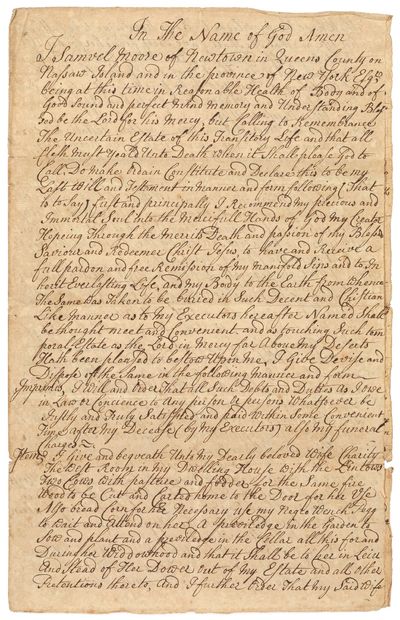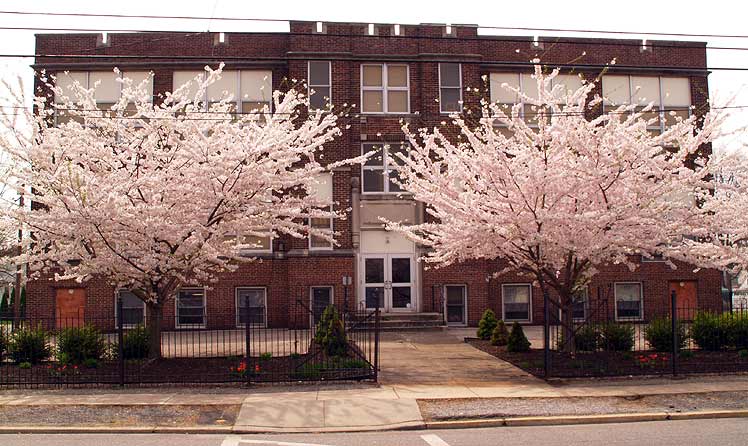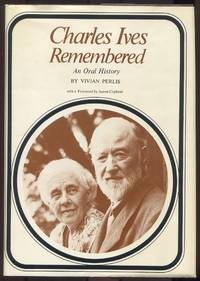Unbound
1752 · Newtown, Queens
by MOORE, Samuel
Newtown, Queens, 1752. Unbound. Very Good. Manuscript Will. Bifolium (8 ¼” x 13”). Neatly written out in ink on four pages. The Last Will and Testament of Samuel Moore “of Newtown in Queens County on Nassau Island” dated May 12, 1752. Signed by Samuel Moore and witnessed by John Hallett, Wm. Moses Hallett, and Samuel Washburn. Old horizontal folds, the second leaf has two small tears at the right edge, very good. An early Will documenting the history of the Moore family homestead, first established in the mid-1600s by the Reverend John Moore (1620-1657). Rev. Moore was Newtown’s first minister, responsible for the founding of the settlement in 1652 and arranging the peaceful purchase of Newtown (present day Elmhurst) from the Mespeatches tribe in 1656. His surviving children were granted 80 acres of land, on which Samuel Moore's father built the principal family home in 1661. This original farmhouse, with later additions, stood on the land until 1933.
Clement Clarke Moore (1779-1863), author of *A Visit from St. Nicholas*, and his father Benjamin Moore (1748-1816) are the best-known descendants of Reverend Moore. Clement spent much of his boyhood at the family estate in Newtown, and his father, who served as the second Episcopal bishop of New York and fifth President of Columbia University, is noted today for having given Holy Communion to Alexander Hamilton on his deathbed. Samuel Moore (1680-1768), a less well-known earlier descendent and the author of this Will, was a teacher who lived on the family estate with his wife Charity Hallett (1685-1758). They were married in 1705 and had a large family of ten children. In 1721, Samuel Moore joined with five of his neighbors to establish the first schoolhouse in Newtown. The first part of the Will concerns Samuel’s wife Charity, including his “negro wench Pegg,” and the second part concerns their surviving sons and daughters. An excerpt follows:
“... I recommend my precious and immortal soul into the merciful hands of God my creator ... I give and bequeath unto my dearly beloved wife Charity the west room in my dwelling house … two cows with pasture and fodder for the same, fire wood to be cut and carted home to the door for her use. Also bread, corn for her necessary use, my negro wench Pegg to wait and attend on her. A privilege in the garden to sow and plant and a privilege in the cellar. All this for and during her widowhood and that it shall be to her in lieu and stead of her dower out of my estate ... and I further order that my said wife shall have the privilege to keep two swine to be fatted for her use ...”
An early primary source document giving a detailed description of the Moore family dynasty and homestead a generation or two before the birth of its most famous son Clement Clarke Moore. (Inventory #: 603953)
Clement Clarke Moore (1779-1863), author of *A Visit from St. Nicholas*, and his father Benjamin Moore (1748-1816) are the best-known descendants of Reverend Moore. Clement spent much of his boyhood at the family estate in Newtown, and his father, who served as the second Episcopal bishop of New York and fifth President of Columbia University, is noted today for having given Holy Communion to Alexander Hamilton on his deathbed. Samuel Moore (1680-1768), a less well-known earlier descendent and the author of this Will, was a teacher who lived on the family estate with his wife Charity Hallett (1685-1758). They were married in 1705 and had a large family of ten children. In 1721, Samuel Moore joined with five of his neighbors to establish the first schoolhouse in Newtown. The first part of the Will concerns Samuel’s wife Charity, including his “negro wench Pegg,” and the second part concerns their surviving sons and daughters. An excerpt follows:
“... I recommend my precious and immortal soul into the merciful hands of God my creator ... I give and bequeath unto my dearly beloved wife Charity the west room in my dwelling house … two cows with pasture and fodder for the same, fire wood to be cut and carted home to the door for her use. Also bread, corn for her necessary use, my negro wench Pegg to wait and attend on her. A privilege in the garden to sow and plant and a privilege in the cellar. All this for and during her widowhood and that it shall be to her in lieu and stead of her dower out of my estate ... and I further order that my said wife shall have the privilege to keep two swine to be fatted for her use ...”
An early primary source document giving a detailed description of the Moore family dynasty and homestead a generation or two before the birth of its most famous son Clement Clarke Moore. (Inventory #: 603953)



